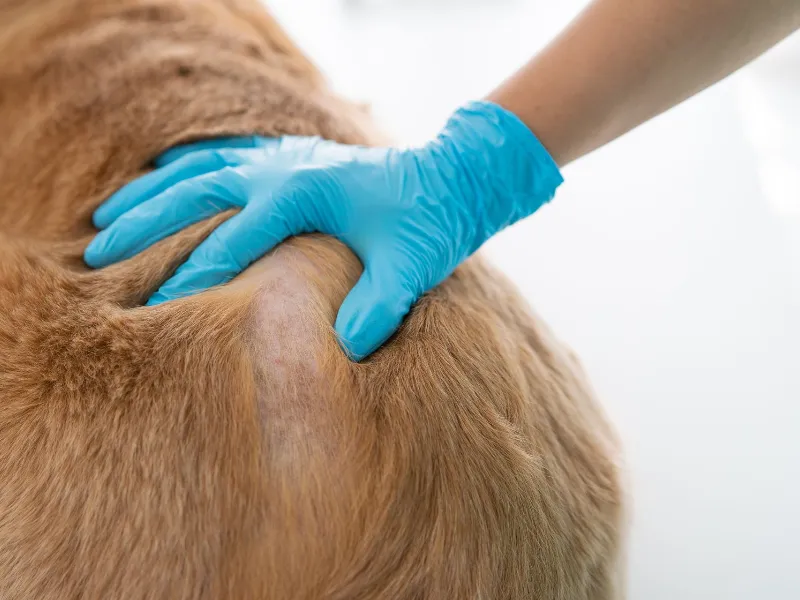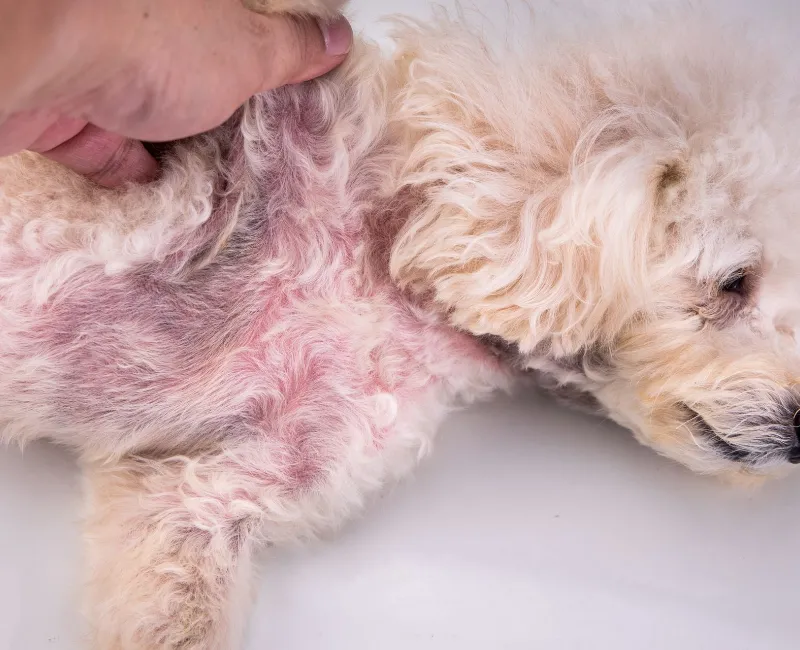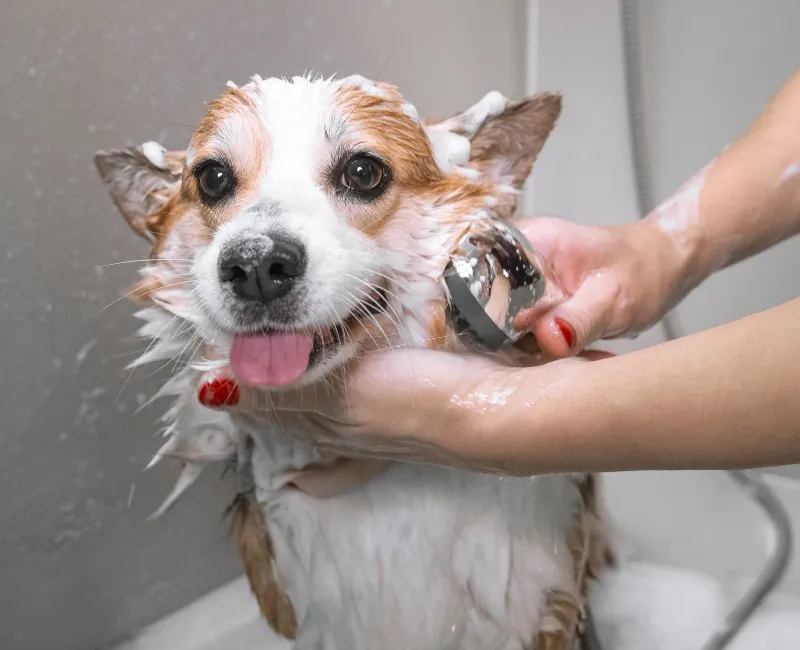Pets experiencing skin irritation, constantly scratching or licking themselves, are common. It can be a symptom of an allergy to something in their environment or a nasty “Hot Spot,” which is an inflamed area of skin resembling a moist or oozing rash. When your pet is scratching or licking itself frantically, or the behaviour has continued for more than 24 to 48 hours, it is time to consult your vet.
“The sooner we can diagnose the problem, the sooner we can begin an effective treatment.”

Common skin conditions that require attention
Atopic dermatitis is the most common condition we experience at Edgeworth Animal Medical Centre. This skin disease can be triggered by environmental allergens such as pollen, mould, or dust mites. We see most allergic skin disease in younger pets, typically between 2 and 5 years old. Atopic Dermatitis can’t be cured, but it can be managed. By developing a treatment plan with your vet, your pet will live a comfortable and fulfilled life.
We mentioned “Hot Spots,” which are acute moist dermatitis. These can appear quickly and form patches on the skin that appear moist and oozing. They look painful, and they are. They are very itchy and uncomfortable for your pet. Continued scratching, licking, or chewing of the area will worsen and may spread the sore. It is essential to seek professional veterinary assistance as soon as possible.
Prolonged scratching and licking can result in a parasitic infestation or a secondary infection. Open wounds caused by scratching are a playground for bacterial or fungal infections.If you notice an unpleasant odour, greasy or waxy skin, or a visible sore or scab, your pet may have an infection and need fast treatment to contain the spread. Other parasites, like fleas and mites, are significant contributors to pet skin irritation issues.
Pets rely on their owners for their needs, including feeding, play, love, and health. Pet owners must be vigilant and watch for signs that their pets are in distress. Early intervention is the best way to mitigate serious health issues. Owners need to be aware of:
- An increase in scratching, licking or chewing, especially at the feet or base of the tail
- Patchy hair loss or bald spots
- Scabs, sores, or lesions
- Red or unusually darkened skin
- Odours or greasy, waxy skinIf you notice one or a combination of these, consult your vet as soon as possible.

How we help pets and their owners
At Edgeworth Animal Medical Centre, we advocate for your pet. We have a range of diagnostic tools and treatments to help pets overcome skin irritation issues and relieve the emotional pressure on owners. The sooner we can diagnose the problem, the sooner we can begin an effective treatment.
At our clinic, we perform in-house tests to identify the cause of the irritation. Whether bacterial, fungal, or parasitic, these tests address common issues. A veterinary dermatologist typically handles comprehensive allergy testing, and we will refer your pet to a specialist if required.
- We typically take a multimodal approach to treatment, which means using multiple modes to achieve the most successful outcome.
- We aim to relieve the symptoms using antihistamines, anti-inflammatories, or monoclonal antibody therapies, to reduce the itch at the neurological level.
- We use medicated shampoos and topical treatments to soothe and help heal the irritated skin
- Antibiotics or antifungals to treat secondary infections
- Parasite control using effective preventatives for fleas, ticks, and mites
Long-term treatment strategies may require immune-modulating drugs or a particular hypoallergenic diet.
“Effective treatment of your pet’s skin irritation is a collaborative process between you and your vet.”

What you can do post-treatment
Effective treatment of your pet’s skin irritation is a collaborative process between you and your vet. Preventing recurrences takes a diligent approach; pet owners must take a proactive approach once the skin issue improves. We recommend that pet owners:
- Develop and maintain a schedule of parasite control using year-round vet-recommended products
- Ensure you only use vet-recommended shampoos and creams.
- Feed a high quality diet formulated for skin support
- Monitor your pet’s skin continuously and contact your vet if you notice any recurrence.
The Edgeworth Animal Medical Centre team knows how difficult and often exhausting skin conditions can be for you and your pet.
Our philosophy is to partner with and support you and your pet through the process. Practical, effective, affordable treatment plans, providing education and resources, recommending and coordinating with qualified and trusted specialists, and readjusting treatment plans as required are all part of our continued commitment to supporting our clients and their pets.
We aim to see every pet live a comfortable, healthy, and fulfilling life.
“Our philosophy is to partner with and support you and your pet through the process.”
Veterinary Services
Trusted veterinary care across every life stage, from vaccinations and surgery to diagnostics, dental, and exotic care.
Frequently Asked Questions
What are the most common skin conditions in pets?
Atopic dermatitis and Hot Spots are among the most frequently seen conditions. Both are uncomfortable and require veterinary attention.
When should I take my pet to the vet for skin issues?
If your pet is scratching, licking, or chewing excessively for more than 24–48 hours, or if you notice sores, odours, or hair loss, consult a vet immediately.
How are skin irritations diagnosed at Edgeworth Animal Medical Centre?
The clinic performs in-house testing for bacterial, fungal, or parasitic infections and refers to dermatology specialists for allergy testing when needed.
What treatments are available for pet skin conditions?
Treatments may include antihistamines, monoclonal antibody therapy, medicated shampoos, antibiotics, antifungals, and parasite control.
What can I do after treatment to prevent recurrence?
Maintain year-round parasite control, use only vet-recommended skin products, provide a skin-supportive diet, and closely monitor your pet’s skin.





